USAID-NREL Partnership Newsletter – Fall 2021
Read our Fall 2021 issue for updates on our country activities, events, global technical platforms, and resources.
The USAID-NREL Partnership addresses critical challenges to scaling up advanced energy systems through global tools and technical assistance, including the Renewable Energy Data Explorer, Greening the Grid, the International Jobs and Economic Development Impacts tool, and the Resilient Energy Platform.
Featured News
NREL Hosts Regional Development Mission for Asia's Scott Bartos
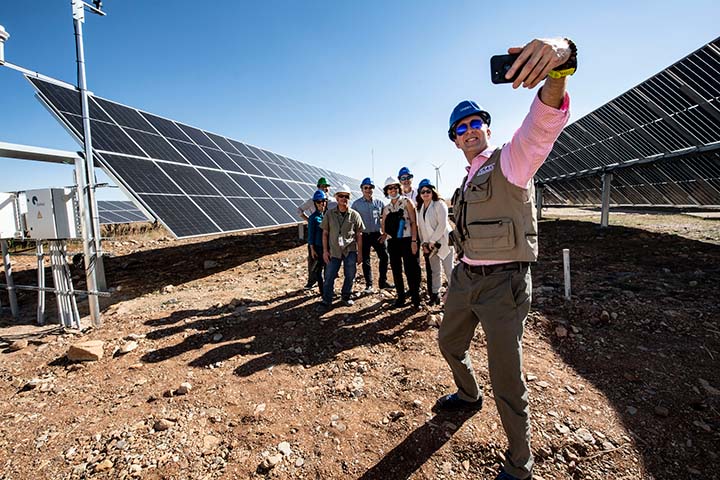
Oct. 5, 2021: Scott Bartos, regional energy advisor, USAID/Regional Development Mission for Asia, tours NREL's large-scale renewable energy modeling capabilities and projects and Advanced Research on Integrated Energy Systems platform at the Flatirons Campus. Photo by Dennis Schroeder, NREL
The Advanced Energy Partnership for Asia's NREL team hosted Scott Bartos, regional energy advisor for USAID's Regional Development Mission for Asia, at the NREL campus Oct. 5–6, 2021. The visit included presentations from NREL technical experts on topics including energy storage, electric mobility, industrial decarbonization, circular economy, and air quality. The NREL team also provided tours of the Flatirons Campus and the Energy Systems Integration Facility to showcase NREL's large-scale renewable energy modeling capabilities and projects (with a focus on photovoltaics, batteries, electric vehicles, and hydrogen) and the Advanced Research on Integrated Energy Systems platform. This visit was geared toward reviewing 2021 Advanced Energy Partnership for Asia activities, including launch of the best-in-class high spatial and temporal resolution solar data set for all of Southeast Asia (available on the RE Data Explorer website), preparing for activities in 2022, and exploring multiyear strategic programs. Building on more than a decade-long relationship between USAID and NREL, the Advanced Energy Partnership for Asia helps partner countries address the technical challenges of transitioning to sustainable, secure, and market-driven energy sectors across Southeast Asia.
For more information about the Advanced Energy Partnership for Asia, visit the USAID-NREL Partnership website.
Interlaboratory Consortium Broadens Technical Support Opportunities and Empowers Energy Sector Workforce in South Asia
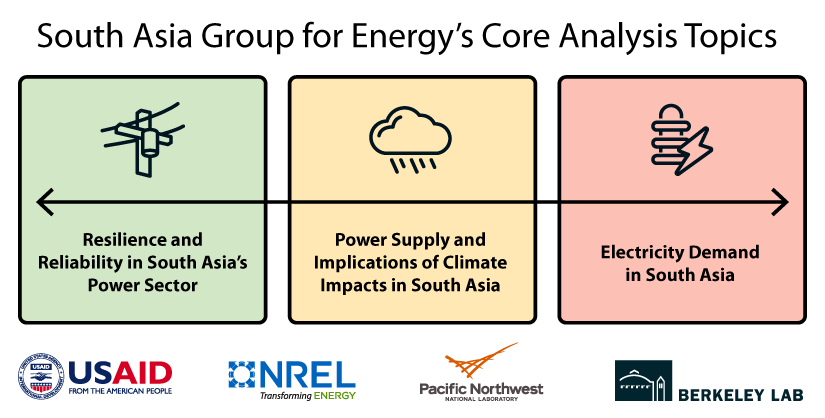
SAGE's core topics define the research, development, and implementation pathways to maintain and strengthen power sector resilience, reliability, and sustainability.
The South Asian Group for Energy (SAGE)—a consortium of USAID, NREL, Lawrence Berkeley National Laboratory, and Pacific Northwest National Laboratory—was launched in 2020 with the goal of creating a more coordinated approach to leveraging technical expertise across the U.S. Department of Energy laboratory complex to support South Asia's clean energy transition. Since its launch, SAGE has been collaborating directly with India's Ministry of New and Renewable Energy's technical institutions on projects that span improving wind forecasting, exploring sustainable bioenergy production, and developing a best-in-class biomass cookstove laboratory, among others.
SAGE also assembled a broad range of South Asian stakeholders to define the research mechanisms, modeling opportunities, and data necessary for understanding the impact of changing economic and environmental conditions on the resiliency and reliability of South Asia's power sector. The first of three reports outlining the results of the work was released in October 2021: Charting a Path for Research and Development of Reliability and Resilience in South Asia's Power Sector.
To learn more about how SAGE represents a vision for reliable, resilient, and sustainable power systems for South Asia, read the full-length story on NREL program news: Interlaboratory Consortium Broadens Technical Support Opportunities for South Asia.
USAID's Gender Equality and Economic Empowerment Projects Launch at United Nations Climate Change Conference
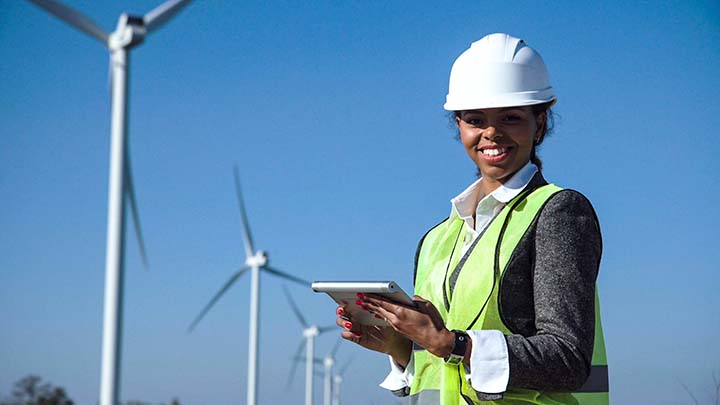
Through the Global Power System Transformation Consortium, the USAID-NREL Partnership is launching a project to advance USAID’s work focused on enhancing women’s economic empowerment and gender equality efforts in the power sector. This collaboration, called Women in Power System Transformation, aims to increase gender equality in the global transition to clean energy by integrating gender equity and economic empowerment. This initiative will provide in-depth technical capacity building for women in developing countries so they can excel in science and engineering professional roles in the rapidly evolving power sector. In partnership with industry and academic institutions, the technical education and training offered will include university-level engineering degree programs and on-the-job training on operational and engineering grid integration approaches. Both fellowship and internship opportunities will be tailored and promoted to encourage the maximum participation of women, paving the way for women to lead the power sector's clean energy transition.
Watch a short video, produced under this initiative and prepared by Imperial College London, that includes interviews with women engineers and leaders about their experiences working in power system operations: Women in Power System Transformation: Skills and Opportunities in Advanced System Operation.
USAID is also developing a project with Lawrence Berkeley National Laboratory to increase the inclusion of women in electrification programs throughout East Africa under the Empower East Africa program. This project will advance women's economic empowerment and climate outcomes. As part of the initial phase of the project, Lawrence Berkeley National Laboratory will conduct community engagement activities, surveys, and field measurements to identify economic activities where improved access to electricity for women can effectively support business development. Afterward, Lawrence Berkeley National Laboratory training will be provided for small business owners on how to achieve savings by improving energy efficiency and identifying financing and credit schemes to acquire energy-efficient equipment.
Both projects were highlighted by the Department of Energy at the United Nations Climate Change Conference (COP26) in the USAID event titled Our Climate Future is Female; Women and Girls Leading Climate Action (remarks begin at 9:32).
Global Events and Trainings
Upcoming Events
Ongoing Webinar Series Presents the Building Blocks of Cybersecurity To Address Critical Caribbean Infrastructure Needs
Making an electric utility cybersecure requires many different lines of effort—hardening networks, preparing for future attacks, monitoring for new vulnerabilities, training staff to identify malware, and assessing which targets are most critical to continuity of operations.
An ongoing webinar series developed through the USAID-NREL Partnership's Resilient Energy Platform's Cybersecurity Resilience toolkit, in collaboration with the Caribbean Electric Utility Services Corp., breaks down these different cybersecurity efforts into user-friendly webinars presented by world-class experts. This webinar series was developed to address the critical infrastructure needs of the Caribbean, based on input from regional electric utility staff. The goal of the Power Sector Cybersecurity Building Blocks webinar series is to raise awareness about all aspects of security and help utilities develop a well-rounded cybersecurity program. The final webinars in this series will take place in early 2022.
Access the videos below or visit the Resilient Energy Platform's Cybersecurity Building Blocks Toolkit for additional resources and information.
Power Sector Cybersecurity standards, Regulations, and Laws: Issues of Compliance, Nov. 17, 2021
Cybersecurity Technical Controls for Utility OT and SCADA, Sept. 22, 2021
Cybersecurity Incident Response, July 22, 2021
Cybersecurity Awareness Training, May 26, 2021
Governance: A Building Block for Power Sector Cybersecurity, May 31, 2021
Building Blocks to Support Cybersecurity in the Power Sector, June 25, 2021
Cybersecurity and Distributed Energy Resources, July 9, 2020
USAID's Power Africa Hosting Collaborative Workshop Series for Renewable Energy Integration in Chad
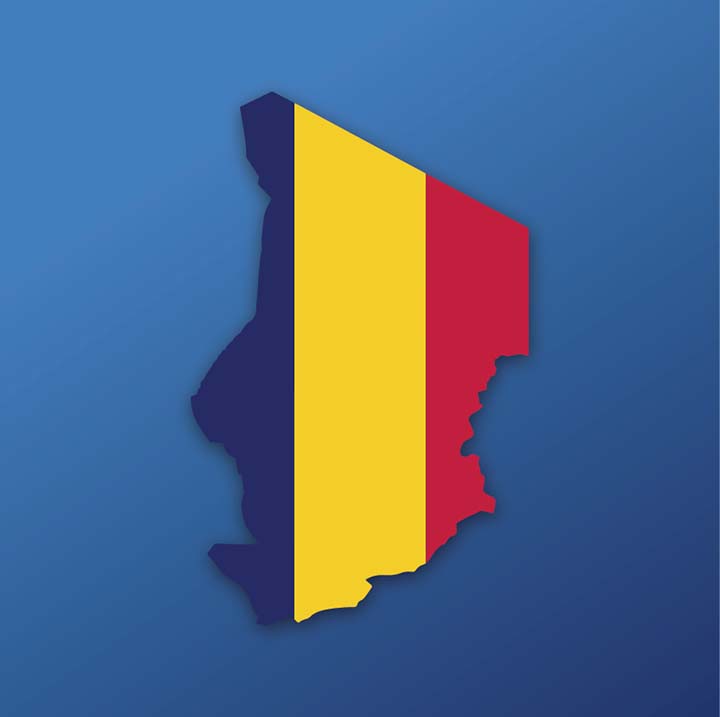
USAID's Power Africa program, with support from NREL, is collaborating with the African Development Bank to provide technical support and assistance to the Government of Chad and other power sector stakeholders to accelerate the deployment and integration of cost-effective renewable energy, increase energy access, and improve service quality.
To initiate the new program, USAID, NREL, and the Government of Chad will host a series of four workshops spanning two topics: Minigrid Planning and Implementation and Energy Sector Master Planning and Operational Modeling. These workshops will be a cornerstone for technical discussion and will help identify specific activities and topics for future in-depth technical assistance and collaboration.
The first workshop occurs in December 2021, and the remaining three will be hosted by January 2022.
Recent Events
USAID-NREL Partnership Represented Across COP26 Events
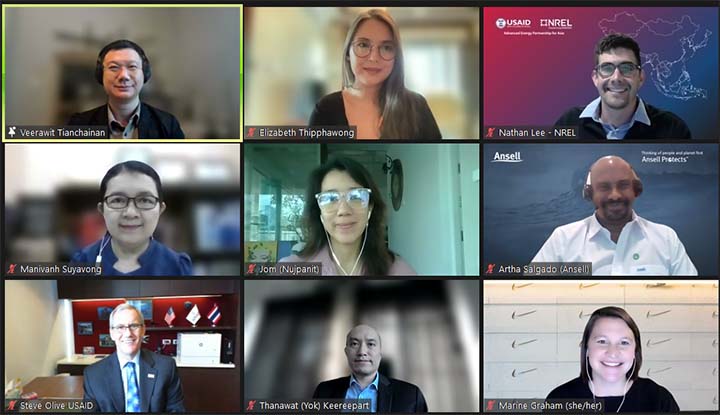
Dr. Nathan Lee representing the USAID-NREL Advanced Energy Partnership for Asia at COP26.
Several members of the USAID-NREL Partnership team participated in events associated with COP26.
On Nov. 5, 2021, NREL's technical lead for the USAID and NREL Advanced Energy Partnership for Asia, Nathan Lee, joined a COP26 event titled Growing Energy Security and Sustainable Energy Solutions in the Lower Mekong Region and the Announcement of the Corporate Clean Energy Alliance. Lee offered remarks on the question of "How can transboundary, or regional, energy planning support sustainably secure energy needs as we move towards collective climate goals, as well as our individual nationally determined contributions?".
Paty Romero-Lankao, a distinguished senior research scientist in NREL's Integrated Mobility Center and frequent contributor to NREL's international efforts, spoke at a COP26 event called Decarbonizing Transport in Emerging Economies. Romero-Lankao shared insights on challenges, solutions, and strategies on decarbonizing and electrifying the transportation industry across Asia, Latin America, and Africa.
The USAID-NREL Partnership's work was also represented at two other sessions: Unlocking Grids to Decarbonize Power Systems Globally with the Global Power System Transformation Consortium and Collaborative Actions to Mainstream Climate Resilience into Energy Planning and Policies. USAID and NREL's participation in COP26 highlights the partnership's expertise in helping partner countries diversify their energy supplies and meet ambitious clean energy targets by increasing renewable energy, pursuing equitable electrification options, scaling up advanced energy systems, and developing integrated cross-border power grids.
To hear Lee's remarks, log in to the COP26 Resilience Hub to watch the full session.
Romero-Lankao's remarks can be found on the U.S. Center's YouTube channel: Decarbonizing Transportation in Emerging Economies.
Three-Day Workshop Held With Tanzania's Power Sector Stakeholders To Discuss Electrification Needs
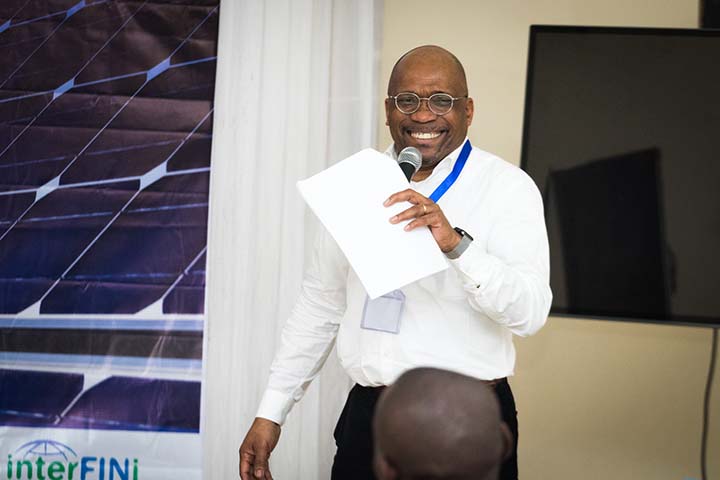
INTERFINi facilitator Peter Mhando at the Greening the Grid Tanzania Workshop.
In October 2021, the USAID-NREL Partnership held a 3-day workshop with power sector stakeholders in Tanzania, where USAID and NREL team members joined virtually. There were 30 participants from both the Tanzanian mainland and Zanzibar, including representatives from the Ministry of Energy; the two national utilities, Tanzania Electric Supply Company Limited and Zanzibar Electricity Corp.; Energy Water Utilities Regulatory Authority; the Rural Electrification Agency; energy sector regulators, and several private sectors.
This workshop, which aims to support Tanzania's transition to a cleaner grid, was the first time these organizations from Zanzibar and the mainland gathered to openly discuss opportunities, challenges, and solutions for scaling up renewable energy deployment in Tanzania. The workshop functioned as a platform to address stakeholder concerns about renewable energy integration and build confidence to ensure it is a viable and cost-effective option for meeting Tanzania's electrification needs. Stakeholders identified specific policy and regulatory interventions that can help create an enabling environment for investment in the renewable energy sector. Modeling tools and analyses that can address technical concerns from the utility were also identified.
NREL Hosts Energy Storage Training Series With Uzbekistan Ministry of Energy
Over an 8-week period, NREL led an energy storage training series for key staff at the Uzbekistan Ministry of Energy. Uzbekistan is undertaking a significant and ambitious shift toward clean energy, with plans to develop 5 GW of solar and 3 GW of wind power and produce 25% of the country's electricity from renewable energy sources by 2030. The Uzbekistan Ministry of Energy is now exploring the role of energy storage technologies in the future capacity mix.
In the first half of the training series, NREL experts covered the fundamental concepts of energy storage for the power system, including the different types of storage technologies, cost and performance metrics, grid services that storage can provide, and the emerging role of energy storage in high renewable energy power systems. The second half of the series provided hands-on training in NREL's System Advisor Model. Key staff at the ministry were trained to use the System Advisor Model to evaluate the techno-economic performance of energy storage projects, both in stand-alone configurations and paired with solar.
Power Sector Learning Series Discusses Variable Renewable Energy Data and Visualization Tools for Vietnam
Vietnam is transforming its power system with an increased share of variable renewable energy (VRE) in its generation mix. The availability of VRE data is critical to further increasing VRE penetration. To this end, NREL worked with various stakeholders in Vietnam to create publicly available high-resolution, multi-year VRE data.
In September 2021, a Power Sector Learning Series webinar provided an overview of VRE data for Vietnam and how the data can be used by different stakeholders to inform VRE deployment decisions. The webinar showcased how NREL's VRE data was used for the USAID Vietnam Low Emission Energy Program Power Development Planning VII's analysis through capacity expansion and production cost modeling. The webinar also featured a presentation of additional visualization tools developed by the team, with support from NREL.
Watch the webinar Power Sector Planning in Vietnam Using Variable Renewable Energy Data.
International Jobs and Economic Development Impacts Modeling Use in Global Green Recovery
The International Jobs and Economic Development Impacts (I-JEDI) model, developed by NREL with support from USAID, is a freely available model that estimates gross economic impacts from wind, solar, biomass, and geothermal energy projects around the world.
On Sept. 27, 2021, world-class experts joined together to discuss opportunities for the I-JEDI model to assist countries in assessing job and economic impacts of clean energy options to support global green economic recovery. The event also includes a demonstration of I-JEDI for potential users and a panel about the tool's applications in South Africa.
Watch the webinar I-JEDI and a Global Green Recovery.
Must Reads
October 2021: Charting a Path for Research and Development of Reliability and Resilience in South Asia's Power Sector
September 2021: Clean Energy Transformation in Bangladesh
Subscribe to Our Newsletter
To stay up to date with the latest news, updates, and events from the USAID-NREL Partnership, subscribe to our quarterly newsletter.
Share


